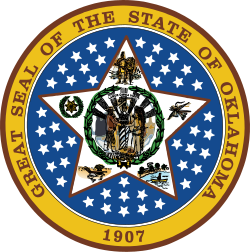| |||||||||||||||||
| |||||||||||||||||
 County results Bellmon: 40-50% 50-60% 60-70% 70-80% Edmondson: 40–50% 50–60% 60–70% 70–80% | |||||||||||||||||
| |||||||||||||||||
| Elections in Oklahoma |
|---|
 |
The 1974 United States Senate election in Oklahoma was held November 3, 1974. Incumbent Republican U.S. Senator Henry Bellmon narrowly won re-election to a second term, beating Representative Ed Edmondson (D-OK) by nearly 4,000 votes. Henry Bellmon was the first Republican United States Senator from Oklahoma ever to win re-election.

